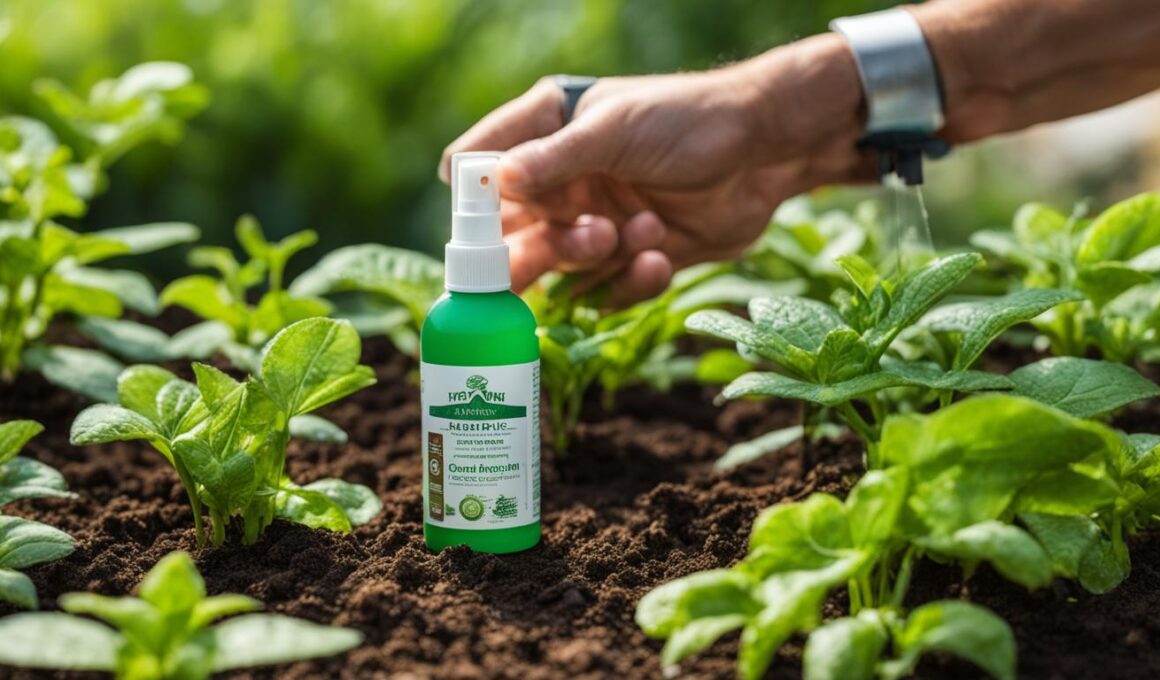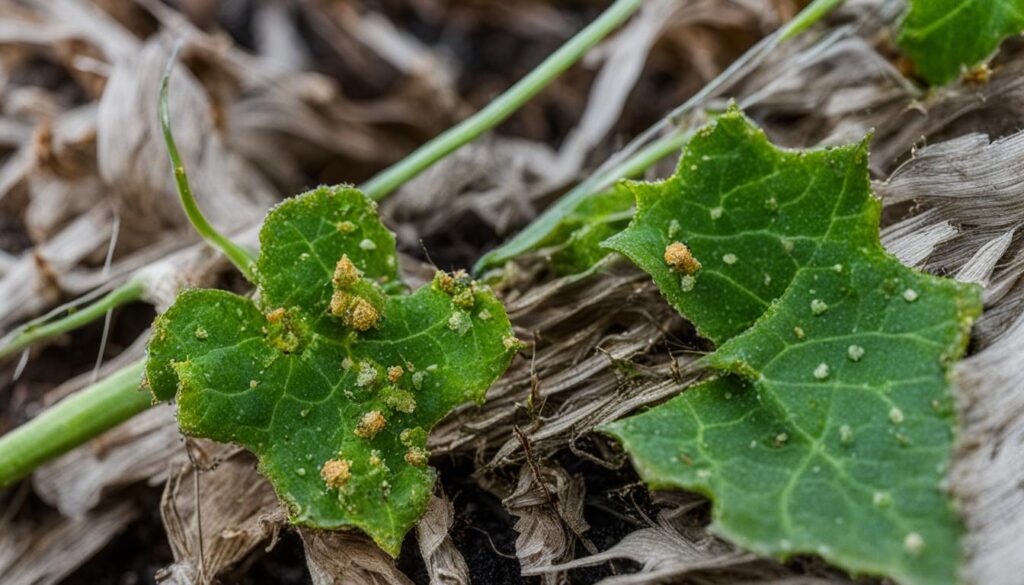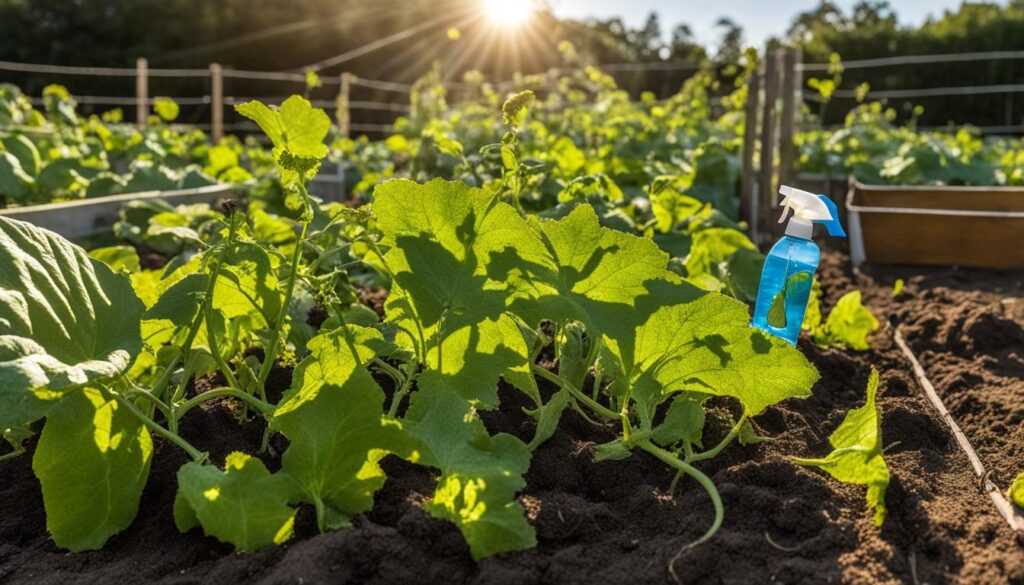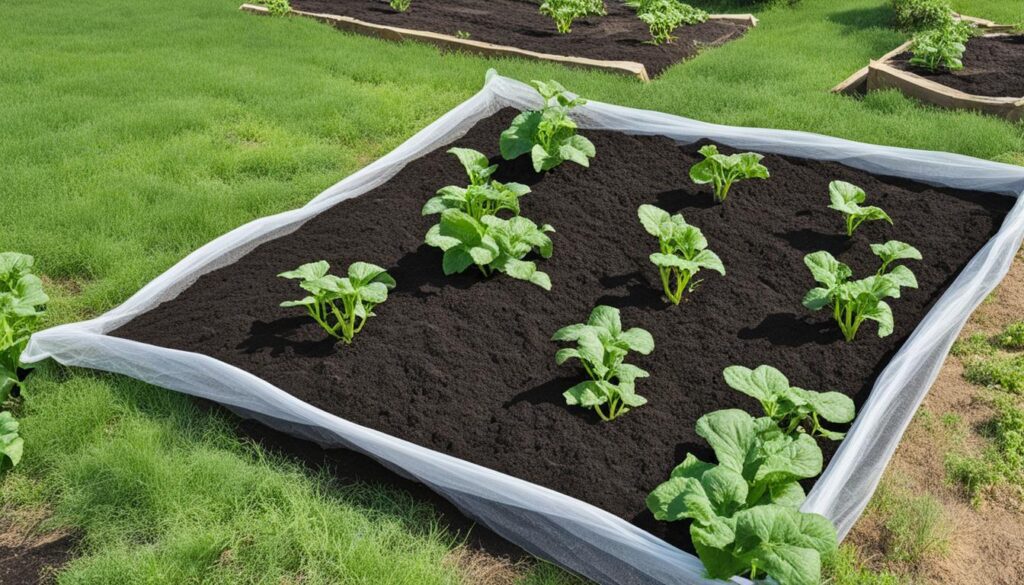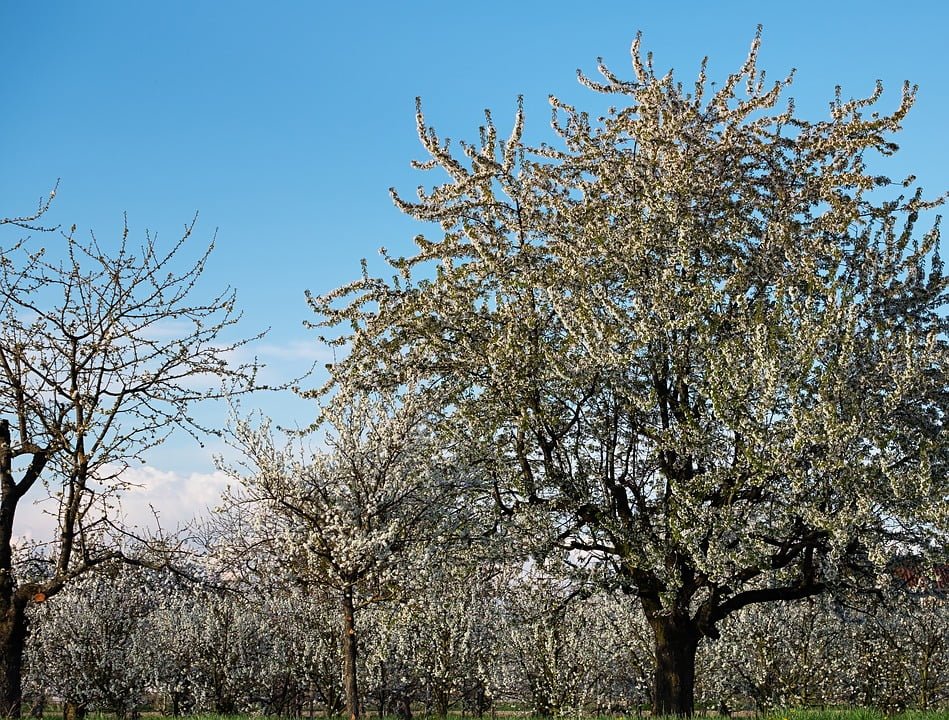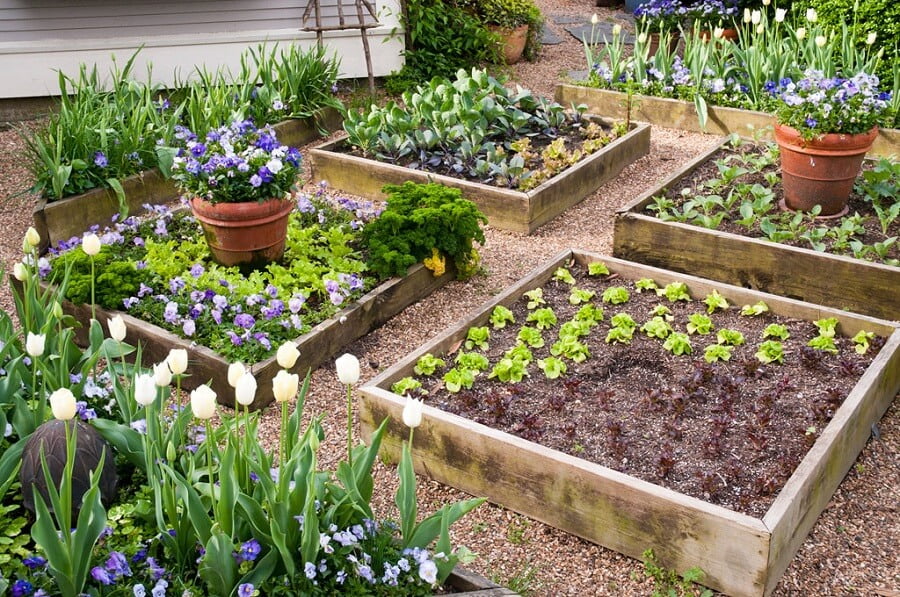Squash vine borers are destructive pests that can wreak havoc on your squash plants. These pesky larvae burrow into the stems and feast on the plant, eventually causing its demise. But fear not, there are effective organic methods you can employ to prevent or stop squash vine borers from ruining your garden.
Key Takeaways:
- Use Bt spray, a natural bacterium that releases a toxin in the larvae’s guts, to prevent squash vine borers.
- Mulching around the base of the plants and using physical barriers like nylon stockings or aluminum foil can deter the adult moths from laying eggs.
- Companion planting with nasturtiums, mint, and radishes repels squash vine borers.
- Practice crop rotation to reduce the risk of infestation.
- Consider using natural remedies like wood ashes and diatomaceous earth as deterrents.
By following these effective tips and taking proactive measures, you can protect your garden from the devastation caused by squash vine borers. Keep your squash plants healthy and thriving, free from the clutches of these destructive pests.
Identifying Squash Vine Borers
Squash vine borers are a destructive pest that can wreak havoc on your precious squash plants. To effectively combat these pests, it is crucial to accurately identify them. Squash vine borers are the larvae of an orange and black sesiid moth. The adult moths lay their eggs on the stems of squash plants, and once the eggs hatch, the larvae burrow into the stems, where they feed on the plant tissues and cause significant damage.
There are several signs to look out for when identifying squash vine borer infestation. First, you may notice wilting leaves that do not recover even after watering. This wilting is a result of the larvae feeding on the stem, disrupting the flow of water and nutrients to the plant. Additionally, small holes in the stems can indicate the presence of squash vine borers. These holes are where the larvae entered the stem. Lastly, you may find brown frass, which is the excrement of the larvae, around the openings in the stems.
It is important to detect squash vine borer infestation early, as once the signs become visible, it is usually too late to save the plant. Regularly inspecting your squash plants for these indicators can help you take prompt action to protect your garden.
Preventing Squash Vine Borers with Bt Spray
Squash vine borers can wreak havoc on your garden, but there are effective methods to prevent their infestation. One such method is using Bt spray, an organic solution that can effectively control these destructive pests.
Bt, which stands for Bacillus thuringiensis, is a naturally occurring bacterium that can be sprayed on squash plants to combat squash vine borers. When the larvae consume the Bt spray, it releases a toxin in their guts that prevents them from feeding, eventually leading to their demise. It is important to choose Bt products that contain the strain Btk, as it is specifically designed to target squash vine borers.
To maximize the effectiveness of Bt spray, it is recommended to apply it twice a week and after rainstorms. This consistent application ensures continuous protection for your squash plants, especially during periods when the pests are most active. Follow the instructions on the product label carefully to ensure proper usage and safety.
Benefits of Using Bt Spray:
- Organic and environmentally friendly
- Effectively controls squash vine borers
- Economical and readily available
- Safe for humans, pets, and beneficial insects
By incorporating Bt spray into your garden care routine, you can significantly reduce the risk of squash vine borer infestation and protect your squash plants from harm. Combine this method with other preventive measures, such as mulching and companion planting, for comprehensive pest control in your garden.
Protecting Squash Plants with Mulching and Physical Barriers
When it comes to protecting your squash plants from the destructive squash vine borers, mulching and physical barriers are two effective methods that can help safeguard your garden. These organic techniques create obstacles that deter the adult moths from laying their eggs and prevent the larvae from burrowing into the stems.
Mulching the stems of your squash plants is a simple yet powerful way to ward off squash vine borers. Apply a thick layer of mulch, such as straw or wood chips, around the base of each plant. This acts as a barrier, making it more difficult for the adult moths to reach the stems and lay their eggs. Plus, mulch also helps retain moisture in the soil and suppresses weed growth, providing additional benefits for your plants.
In addition to mulching, using physical barriers can provide an extra layer of protection for your squash plants. Nylon stockings or aluminum foil strips wrapped around the stems create a physical barrier that makes it challenging for the larvae to chew through and enter the plant. These barriers are cost-effective and easy to implement, making them an ideal solution for preventing squash vine borer infestations.
Benefits of Mulching and Physical Barriers:
- Prevents adult moths from laying eggs on squash plants
- Deters larvae from burrowing into the stems
- Retains moisture in the soil
- Suppresses weed growth
- Cost-effective and easy to implement
By incorporating mulching and physical barriers into your gardening routine, you can significantly reduce the risk of squash vine borer infestations and protect the health of your squash plants. These methods provide an environmentally-friendly and sustainable approach to pest control, allowing you to enjoy thriving and productive gardens year after year.
Companion Planting and Crop Rotation
In addition to using Bt spray, mulching, and physical barriers, incorporating companion planting and practicing crop rotation can further enhance your defense against squash vine borers. Companion planting involves strategically placing certain plants near your squash to repel pests and provide natural pest control. By using plants like nasturtiums, mint, and radishes as companions for your squash plants, you can take advantage of their natural scents that repel squash vine borers. Consider interplanting these companion plants within your squash bed or in proximity to create a pest-repellent environment.
Crop rotation is another effective method to reduce the risk of squash vine borer infestation. By avoiding planting squash in the same area for consecutive years, you disrupt the life cycle of the pests. Squash vine borers overwinter in the soil, so by rotating your crops and planting squash in a different spot each year, you minimize the chances of re-infestation the following season. Implementing a crop rotation schedule can help maintain the health and vitality of your plants while thwarting the presence of these destructive pests.
Benefits of Companion Planting:
- Nasturtiums, mint, and radishes emit scents that repel squash vine borers
- Companion plants act as a natural deterrent, reducing the likelihood of infestation
- Creates a more diverse and balanced ecosystem in your garden
Advantages of Crop Rotation:
- Disrupts the life cycle of squash vine borers by preventing overwintering
- Reduces soil depletion and nutrient imbalances specific to squash
- Minimizes the risk of disease and pest build-up in the soil
By incorporating companion planting and practicing crop rotation, you can fortify your defense against squash vine borers naturally and sustainably. Remember to monitor your plants closely for any signs of infestation and take prompt action to protect them. With these strategic methods, your garden will thrive, free from the devastating effects of squash vine borers.
Natural Remedies and Insecticides
If you’re dealing with a squash vine borer infestation in your garden, don’t worry! There are several natural remedies and insecticides that can help you control these pesky pests. Here are some effective options:
Natural Remedies:
- Wood ashes: Sprinkling wood ashes around your squash plants can help deter squash vine borers. These pests dislike the alkaline nature of wood ashes, making them less likely to lay their eggs on your plants.
- Diatomaceous earth: Apply a thin layer of diatomaceous earth around the base of your squash plants. This powdery substance contains microscopic fossilized algae that can physically damage the larvae when they come into contact with it.
- Black pepper: Sprinkling black pepper around your plants can act as a repellent for squash vine borers. They dislike the strong scent of black pepper and are less likely to approach your plants.
Insecticides:
“Insecticides can provide effective control of squash vine borers, but it’s important to choose the right product and apply it at the right time. Here are two commonly used insecticides for squash vine borer control:”
- Carbaryl: This insecticide is effective against squash vine borers. It should be applied when the larvae are hatching, as it works best when the pests are still in their early stages.
- Permethrin: Another option is permethrin, which can also be effective against squash vine borers. Like carbaryl, it should be applied when the eggs are hatching for maximum efficacy.
When using any insecticide, it’s important to carefully read and follow the instructions on the label. Always wear appropriate protective gear and avoid applying the insecticides during the heat of the day to minimize the risk to beneficial insects.
By utilizing these natural remedies and insecticides, you can take proactive steps to control squash vine borers and protect your precious squash plants from their destructive impact. Remember to monitor your plants closely and take action at the first signs of infestation to prevent further damage. With these tools in your gardening arsenal, you’ll be well-equipped to combat squash vine borers and enjoy a thriving garden.
Conclusion
Protecting your garden from squash vine borers is essential for maintaining healthy squash plants. By implementing these effective tips, you can prevent and stop squash vine borers from damaging your plants.
Start by using Bt spray, an organic and effective method to control squash vine borers. Apply it twice a week and after rainstorms for optimal protection. The toxin released by Bt spray prevents the larvae from eating and eventually kills them.
In addition to Bt spray, mulching the stems of squash plants and using physical barriers can also provide protection. Apply a heavy mulch around the base of the plants to deter the adult moths from laying their eggs. Consider using strips of nylon stockings or aluminum foil wrapped around the stems to create a physical barrier that is difficult for the larvae to chew through.
Companion planting with plants like nasturtiums, mint, and radishes can help repel squash vine borers. These plants emit scents that deter the pests, keeping them away from your squash plants. Furthermore, practicing crop rotation by not planting squash in the same area two years in a row can reduce the risk of infestation. This prevents the pests from overwintering in the soil and attacking your plants the following year.
Remember to closely monitor your squash plants for signs of infestation and take immediate action to protect them. By following these strategies, you can enjoy a thriving garden free from the devastation caused by squash vine borers, keeping your squash plants healthy and productive.
What are some preventative measures to keep vine borers away from gardens?
To keep squash vine borers away from gardens, here are some tips for squash vine borer prevention. Plant squash varieties that are resistant to vine borers. Place floating row covers over the plants at the beginning of the season to prevent adult moths from laying eggs. Inspect plants regularly for signs of infestation and remove any affected vines.
FAQ
How can I identify squash vine borers?
Squash vine borers are the larvae of an orange and black sesiid moth. Signs of infestation include wilting leaves, small holes in the stems, and brown frass around the openings.
What is Bt spray and how does it prevent squash vine borers?
Bt (Bacillus thuringiensis) spray is a natural bacterium that can be sprayed on squash plants to control the larvae. Bt spray releases a toxin in the larvae’s guts, preventing them from eating and eventually killing them.
How can I prevent squash vine borers using mulching and physical barriers?
Applying a heavy mulch around the base of squash plants can deter adult moths from laying their eggs. Physical barriers like nylon stockings or aluminum foil wrapped around the stems create a barrier that is difficult for the larvae to chew through.
What are some companion plants and crop rotation techniques to deter squash vine borers?
Companion plants like nasturtiums, mint, and radishes emit scents that repel squash vine borers. Crop rotation involves not planting squash in the same area two years in a row to reduce the risk of infestation.
What are some natural remedies and insecticides to control squash vine borers?
Wood ashes, diatomaceous earth, and black pepper can be sprinkled around the plants to deter the pests. Insecticides containing carbaryl or permethrin can also be effective when applied at the right time.





